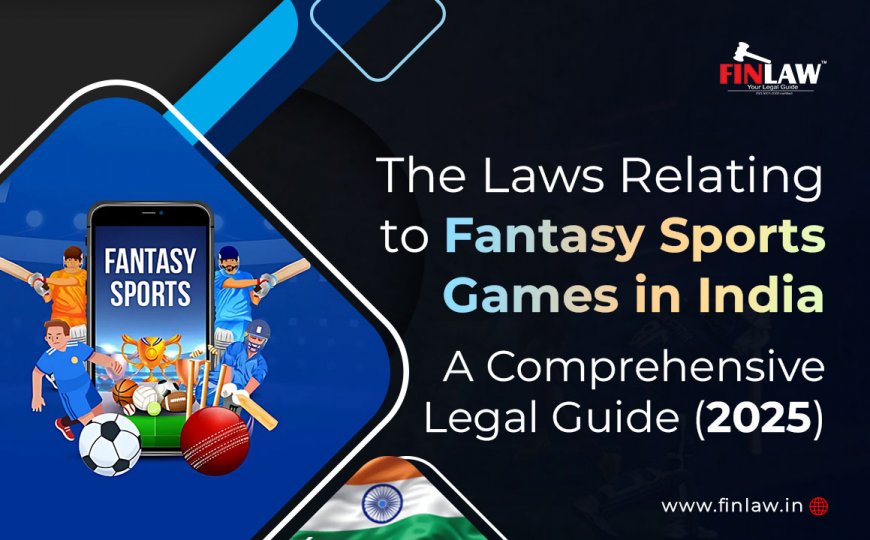The Laws Relating to Fantasy Sports Games in India: A Comprehensive Legal Guide (2025)
Explore the laws relating to fantasy sports games in India in 2025. Understand legality, tax rules, state-wise bans & upcoming regulation changes.

Fantasy sports games have become a multi-billion-rupee industry in India, blending passion for sports with skill-based gaming. However, the legal status of fantasy sports remains a hot topic due to varying judicial interpretations and state-level regulatory discrepancies. This guide aims to unpack the laws relating to fantasy sports games in India, offering clarity to players, operators, and investors alike in 2025.
What Are Fantasy Sports?
Fantasy sports are online games where users create virtual teams composed of real-life athletes from professional sports. The outcome depends on the real-time performance of these athletes in actual matches. Popular platforms in India include Dream11, MPL, My11Circle, and FanFight.
The core principle behind fantasy sports is skill-based selection, differentiating them from games of pure chance like betting or gambling.
The Legal Framework Governing Fantasy Sports in India
Fantasy sports are regulated under a patchwork of national laws, state laws, and judicial interpretations. The primary legal framework includes:
-
The Public Gambling Act, 1867 – Prohibits gambling but excludes games of skill.
-
State-specific gambling laws – Some states have adopted their own legislation.
-
Information Technology Act, 2000 – Governs online platforms but lacks specific provisions for fantasy sports.
-
Consumer Protection Act, 2019 – Applies to disputes between users and operators.
Since no central law explicitly regulates fantasy sports, legality is often determined on a case-by-case and state-by-state basis.
Skill vs. Chance: The Core Legal Debate
The distinction between “games of skill” and “games of chance” is central to the legality of fantasy sports.
Games of Skill (Legal)
-
Require knowledge, judgment, and analytical ability.
-
Fantasy sports fall under this category if the outcome is influenced more by skill than chance.
Games of Chance (Illegal under Gambling Laws)
-
Based on luck or randomness, such as betting on match outcomes or playing roulette.
The Supreme Court and several High Courts have consistently emphasized that games predominantly involving skill are legal.
Key Judicial Rulings on Fantasy Sports
1. Varun Gumber v. Union of India (2017) – Punjab & Haryana HC
-
Held that fantasy sports are games of skill.
-
Supported the legality of Dream11.
2. Chandresh Sankhla v. State of Rajasthan (2020) – Rajasthan HC
-
Reinforced that fantasy sports are not betting or gambling.
3. Supreme Court Ruling (2021)
-
Dismissed multiple SLPs against fantasy sports.
-
Indirectly validated the legality of games like Dream11.
These rulings are crucial precedents protecting fantasy platforms from prosecution under gambling laws—though they are not binding nationwide.
State-Wise Regulatory Differences
Since gambling is a state subject, legality varies across Indian states:
|
State |
Status of Fantasy Sports (2025) |
|
Maharashtra |
Grey area – covered under Bombay Wager Act |
|
Telangana |
Banned – considers fantasy sports as gambling |
|
Tamil Nadu |
Previously banned but partially lifted |
|
Karnataka |
Initially banned but now legal post HC ruling |
|
Sikkim, Nagaland |
Require licensing – fantasy games allowed |
|
Others (Delhi, Punjab, Rajasthan, etc.) |
Generally permitted |
Operators must ensure geo-fencing and compliance with state-specific rules.
The Role of the Fantasy Sports Regulatory Authority (FSRA)
In 2024, the Indian government proposed the establishment of the Fantasy Sports Regulatory Authority (FSRA) under the Ministry of Electronics and Information Technology (MeitY). While not yet passed as law, the proposed framework includes:
-
Central licensing for fantasy sports operators.
-
Strict compliance with data protection, KYC norms.
-
Prevention of underage gaming and addiction.
As of mid-2025, the draft legislation is under review and expected to become law within the year.
Self-Regulation through FIFS
The Federation of Indian Fantasy Sports (FIFS) acts as a self-regulatory body, ensuring ethical practices in the industry. Key guidelines include:
-
Age verification (18+).
-
Transparent scoring system.
-
Responsible gaming initiatives.
Several top platforms in India are registered under FIFS, adding a layer of trust and compliance for users and regulators alike.
GST and Taxation on Fantasy Sports
The Goods and Services Tax (GST) on online gaming, including fantasy sports, has been a contentious issue.
Current Tax Regime (2025):
-
28% GST applicable on the total contest entry amount (CEA).
-
Operators are also subject to income tax and TDS obligations.
-
Users winning over ₹10,000 are subject to 30% TDS under the Income Tax Act.
This high tax burden has led to reduced margins and concerns among fantasy operators, with lobbying efforts underway to reclassify fantasy games under a lower GST slab.
Is Fantasy Sports Legal in India in 2025?
Yes, but with conditions. As of 2025:
-
Fantasy sports are legal in most Indian states, provided the platform offers games of skill.
-
Players must be 18 years or older.
-
Operators must adhere to tax, KYC, and responsible gaming regulations.
-
Legality can still vary depending on state laws, and legal challenges may arise.
What the Future Holds: Legal Reforms and Challenges
With fantasy sports gaining popularity and revenues touching ₹20,000+ crore annually, legal reforms are imminent. Here’s what we expect in the coming years:
Upcoming Developments:
-
FSRA Act for centralized regulation.
-
A possible national licensing framework.
-
Differentiated tax slabs for games of skill vs chance.
-
Increased focus on player protection, addiction control, and transparency.
However, challenges include:
-
Reconciling central and state laws.
-
Preventing misuse and illegal betting under the guise of fantasy sports.
-
Addressing public morality debates.
Conclusion
The landscape of fantasy sports laws in India is evolving, with increasing recognition of fantasy games as skill-based and legitimate. While most courts support their legality, operators and players must remain vigilant of state-specific restrictions and adhere to tax and compliance norms.
As India moves towards more defined regulation with the proposed FSRA, the industry is poised for sustainable growth—provided stakeholders stay within the boundaries of the law.
FAQs: The Laws Relating to Fantasy Sports Games in India
1. Is fantasy sports legal in India in 2025?
Yes, fantasy sports are legal in most Indian states if they are games of skill.
2. Do I have to pay tax on fantasy sports winnings?
Yes, winnings above ₹10,000 are subject to 30% TDS.
3. Can I play fantasy sports in Telangana?
No, Telangana currently bans online fantasy gaming under its gambling laws.
4. Is Dream11 legal in India?
Yes, Dream11 has been upheld as legal in various court judgments, but users should check their state laws.
5. Will there be central regulation of fantasy sports soon?
Yes, a bill proposing the FSRA (Fantasy Sports Regulatory Authority) is under consideration as of 2025.
What's Your Reaction?



















